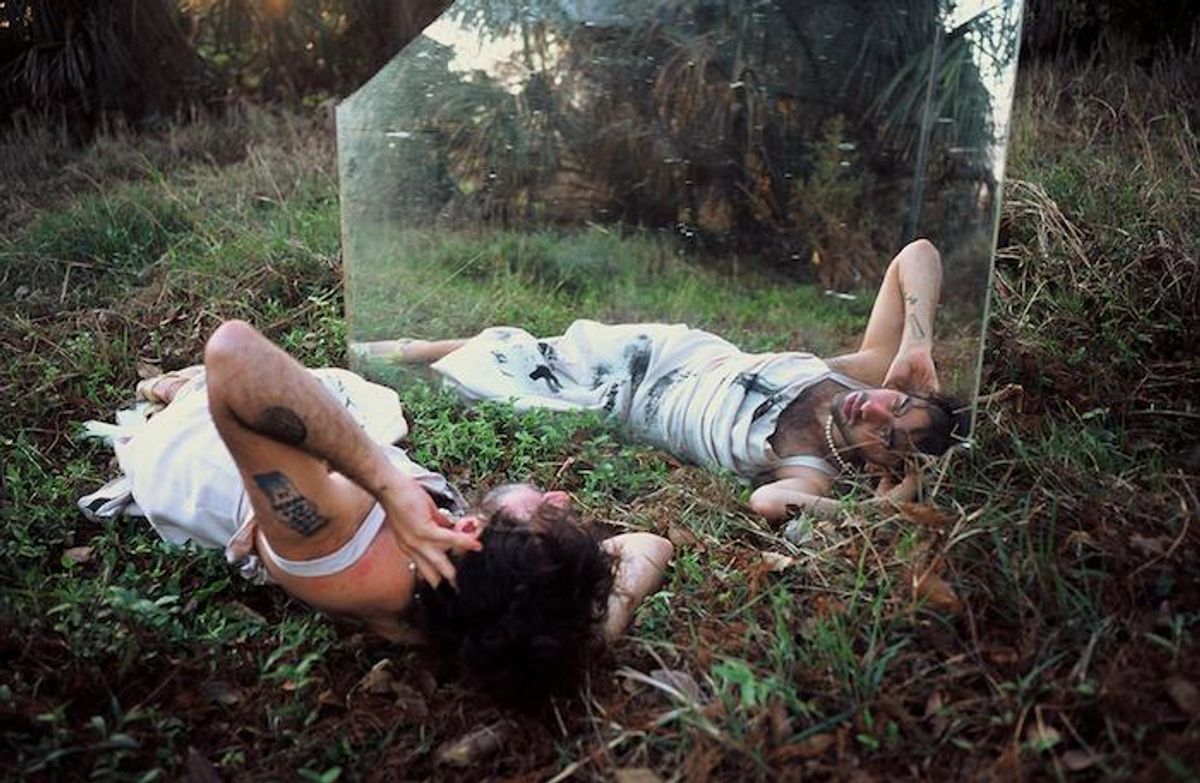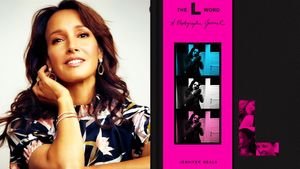"I'm making music for queers, artists and weirdos--outcasts," says Local Honey, the artist behind electronic noise project Oblivia, whose second album Martyr Complex is out today. "A lot of my music is about grotesque identity and grotesque visions of gender and my reality within those constructs. I make a lot of my work about community and the people around me and queer party culture."
On her new album, as on her debut
I Fell Asleep Like This, Honey uses distortion and effects to siphon different voices and personas as a way to evoke an idea of sonic womanhood. "I don't particularly identify as a woman," she told
OUT. "But I'm non-binary and performance has been an important outlet to explore that, and that has influenced my daily life and presentation, which fluctuates pretty drastically." Through vocal modulation, Honey is able to create voices that an assigned male body would not normally make, exaggerating them until they become grotesque and monstrous--divine one moment and terrifying the next.
Honey has been a mainstay of the New Orleans queer DIY scene for years, working primarily in performance art and drag before turning to music, originally under the name White Girl Wasted. "The project was first a platform for Honey to immerse herself in the darker parts of underground queer life, creating music that explored the intersection between pain and excess. Now as Oblivia, the artist is tackling the idea of martyrdom on her new record.

"The album is a very dramatic way of looking at the world, and how we're maybe living in an apocalyptic moment where something is coming to an end--looking at that through a queer perspective and how that relates to your identity falling apart," Honey said, reflecting on the idea of what it means to be a martyr. "We're in a moment where a lot of society is realizing that what is happening is not working for the world, and in a way the people living today are martyrs in order to figure that out. All of history you can look at that way, that people die to teach us this lesson."
Certainly queer people have been martyrs for social change throughout history, like the black trans women who jumpstarted the ironically named gay rights movement and are often invisibilized within the queer community. In the past week, three trans women of color were murdered (two just miles from Honey's home in New Orleans), and yet their deaths have made barely a blip in the media. As a queer artist working largely in underground DIY spaces, Honey has seen firsthand how marginalized queers--people of color, trans people, femmes--are unable to access the same safety as white cisgender gay men.
In the last year, Honey lost two young friends, one of which was Cash Askew, a trans woman and musician who died in the Ghost Ship fire. Conversation surrounding the tragedy blamed the building's poor safety precautions, missing the point that safety for marginalized people means something different than it does to those with access to privilege and capital. Fire codes aside, underground spaces are often more safe for trans people and people of color than clubs with clearly marked fire exits. "Often you have to sacrifice your physical safety in order to find a healthy environment," Honey said.

The idea of safety and the way it exists on a different praxis for queers is something Honey plans to continue exploring on her next album, tentatively titled The Suburban Myth. "I want it to be about how the concept of safety doesn't exist, and how especially for marginalized people it can never exist," Honey said. "It's something you can't really promise without lying in some way. Safety is a concept that maybe comes out of whiteness, out of growing up in the suburbs, and then learning about social justice in an academic environment."
New Orleans is a perfect breeding ground for Honey's work: the city is home to a thriving art scene more populated by punks than yuppies, where the queer scene specifically is centered more on femmes than cis gay men. But that doesn't mean Honey's not interested in having her art reach those outside her own community; while she doesn't necessarily care about being relatable, she finds it interesting that deeply queer art can still reach and impact non-queers.
"[Straight people] come up to you and say that it really helped them deal with gender in some kind of way," she said. "It's also been an interesting way to engage with gays who don't necessarily identify with the label 'queer' and don't understand gender variance. It's a way to deliver it them in a more relatable way, or not, and they're offended by it, which is fun, too. It's fun to poke at our community, the different aspects of it, and how we often end up in the same spaces and don't understand each other or help each other out, but we could do that a lot more."
Stream Oblivia's Martyr Complex, below.



























































































Did 'The White Lotus' waste Lisa's acting debut?